Key points
- Sanguli residents risk dangerous journeys just to access a mobile signal.
- Poor network coverage affects education, health, and economic opportunities.
- A lack of infrastructure and government response worsens the situation.
In Sanguli, a rural farming community in Ghana’s Saboba District, residents risk their safety daily in search of a mobile signal. The community struggles with poor network coverage, often gathering beneath a tree they ironically call “MTN” to catch a faint mobile signal.
In a digital age, this spot serves as their lifeline. It allows them to stay connected despite limited access to reliable communication.
Esther (a pseudonym), a resident of Sanguli, shared her ordeal. She travels several kilometers to Saboba just to send mobile money to her brother.
When her bicycle breaks down, she spends GH¢30 on transport, an additional burden on her already difficult life. “Even to receive a MoMo alert, we must travel to a nearby village with a signal,” she said.
These risky trips often take her over rocky and dangerous roads. The community has witnessed several heartbreaking incidents. One involved a pregnant woman who lost her baby because she couldn’t make an emergency call due to the lack of signal.
Nkunkpakikpe Dalafu, an opinion leader, recalled at least 15 cases of snakebites. In these cases, residents ventured into the bush at night searching for a signal, risking even greater harm.
The far-reaching consequences of poor network coverage
The lack of a strong network also disrupts education. Teachers are reluctant to take posts in Sanguli, knowing they will face communication challenges that affect their ability to work effectively.
For young people like Gmajinbo Daniel, a university graduate, the absence of reliable communication led to missed job opportunities. He had to rent a room in Saboba just to stay connected while searching for work.
For residents, the digital divide means missing out on mobile banking, online education, and agricultural innovations. These barriers stifle economic growth, limit access to information, and deepen the cycle of poverty.
Socially, poor communication has led to strained relationships, as seen in the case of Mabefam Konja, a mother whose son’s long-distance relationship fell apart due to the lack of consistent contact.
A call for action and a sustainable solution
Despite the efforts of local leaders like Dalafu Emmanuel, who highlights the absence of a modern network tower, the community continues to struggle.
The lack of proper infrastructure hampers emergency responses and prevents farmers from connecting with buyers, suppliers, and agricultural officers. This leaves much of their produce to rot on the farm.
Although the Ghana Investment Fund for Electronic Communications (GIFEC) is tasked with expanding telecom access to underserved areas, the government’s rural telephony project has not yet provided a permanent solution.
Repeated requests for assistance have gone largely unanswered, and residents are frustrated with the delays. Tilako Timugnee Francis, the Assemblyman for Sanguli, called on the government and telecom operators to act swiftly.
He urged them to build a permanent, modern telecom tower to stabilize the signal and prevent interference from foreign networks like Togocel.
For the people of Sanguli, connectivity is not a luxury—it’s a matter of safety, opportunity, and dignity. As Ghana continues its digital transformation, communities like Sanguli must not be left behind. Residents are simply asking for what many take for granted: the right to connect.




